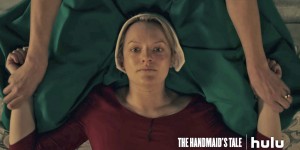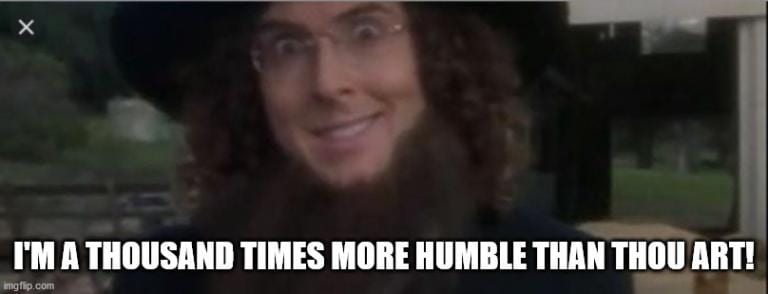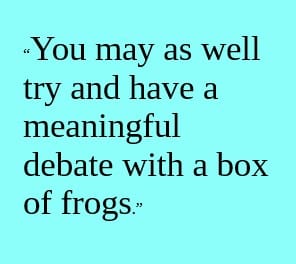 by Samantha Field cross posted from her blog SamanthaPField.com
by Samantha Field cross posted from her blog SamanthaPField.com
Quick update: I took a month off after seminary classes ended, and then I had to play catch-up with some of the volunteer work I’ve been doing since the election. That is finally starting to become a manageable about of work, so hopefully starting next week we can get back to regular blog updates!
This was a post I wrote for Relevant a while ago, but they have decided not to publish it (incidentally, the post they did publish was written by a man I dated at Liberty. It’s … insipid, unsurprisingly). The below only covers the first four episodes of The Handmaid’s Tale, since those were the only ones available when I wrote it. So, spoilers for those episodes, and for some of the book.
***
The first time I read The Handmaid’s Tale I was at Liberty University, taking a utopian/dystopian literature class for an English master’s degree. I practically inhaled it, and it was my favorite of all the assigned readings that semester. In her introduction to the work, our professor noted that Atwood had limited her narrative to things that have already taken place. In Atwood’s words, “I made it a rule … that I would not put anything into it that human societies have not already done.”
When I arrived in class to discuss it, I was surprised by several of my classmate’s reactions. I did not expect everyone to love the book, but I didn’t think that some would react as negatively as they did. Much of the discussion that day was devoted to arguing whether Atwood had written nothing more than a straw man. Several claimed that she simply hated Christianity and wanted to give our religion a bad name—that the whole premise of the book was preposterous and stretched the suspension of disbelief beyond the breaking point. Unlike the other dystopias we’d read, The Handmaid’s Tale wasn’t criticizing anything that did or could exist. Christians just could not do this, they said.
I struggled with their reaction because I knew from firsthand experience they were wrong. In the years since then, and especially since Hulu’s release of their screen adaptation, I’ve thought often about the irony that my fellow students made their arguments in Liberty’s DeMoss building, and Nancy Leigh DeMoss wrote in her evangelical bestseller Lies Women Believe that the Civil Rights and Suffrage movements had been deceived by Satan’s lie that “I have rights,” and that pursuing those rights made them like sinful Jonah, “estranged from God” (74-76). The largest academic building on Liberty’s campus shares the name of a woman who thought the Civil Rights movement was sinful, and she wasn’t just critiquing the form of the activism, either, but arguing that it is a sinful lie for us to believe that we—specifically women and people of color—have rights.
As I re-read the book and watched the first four episodes of the show, I’ve also struggled with how to put the feelings I have into words. My response is visceral, but I know I’m not reacting to the events of the plot. I don’t live in a country reeling from a plague of infertility and governed by martial law. However, we do live in a world where many Christians proclaim the same ideas as the Aunts and Commanders, and we must admit that The Handmaid’s Tale is no straw man.
During one flashback to the time before handmaids exist, June (Offred) and Moira encounter a woman while jogging whose face contorts into disgust because of the typical workout clothes they’re wearing. My heart clenched in my chest because I have both given and received that expression. Growing up, I looked at women who dressed “immodestly” with disdain; as an adult, I wore a dress to a concert on a conservative Christian college campus that showed a hint of cleavage and my husband remarked he was surprised that several women didn’t actually spit on me, their faces showed that much revulsion. Later in the same scene, a barista uses degrading terms for June and Moira—again because of their workout clothes—and I couldn’t help but think of the countless articles on how yoga pants are “immodest.” Those articles may not use the same degrading language, but the ideas are the same: only women who want sexual attention from men dress that way.
One of the more heartbreaking scenes is in the first episode, when Jeanine is “Testifying” about being sexually assaulted and blames herself for what happened. The other women agree, chanting “her fault, her fault.” That scene saddens and horrifies me in the same way I’m saddened and horrified when I encounter it in Christian books. In Stasi Eldredege’s Captivating, she talks about how she “put [her]self in a dangerous position” because she’d been drinking and accepted a ride back to her hotel—the same rationale Jeanine uses to blame herself for being assaulted (79). In Real Marriage, Grace Driscoll talks about her own assault in similar terms: her assault is “her own sin” (128), she was “condemned by her sin” (132), and she repeatedly emphasizes the need for her to “repent” for being assaulted (127, 129, 130). This idea is ubiquitous in Christian culture, and I’ve experienced the pain of being blamed—and told to repent—for my rapes more than once.
However, one of the strongest themes woven throughout The Handmaid’s Tale is the teaching that women, and particularly handmaids, are a “precious resource” that must be protected. Aunt Lydia teaches the handmaids at the Red Center that this protection is a sign of just how much their culture privileges women—the handmaids are lucky, so extraordinarily blessed, to be so honored. This lesson is emphasized in one of the more harrowing scenes from the show. During a “Salvaging,” the handmaids are told that the man standing before them is a convicted rapist and they are given permission to do anything they want to him. This action is intended to demonstrate that their country actually does value them, and desires to protect them. If they only obey the system, they will be protected; in the rare occurrence when they are not, they will see true justice—but only if they follow the rules. Stray outside the rules and they are “putting themselves in a dangerous position.”
Christian culture is replete with this teaching, and it can take many forms. In popular books and programs, women are given the rules: do not have close friendships with boys, do not be alone with boys, dress modestly, keep yourself pure, don’t allow “heavy petting,” date with intention, seek your parent’s guidance… In exchange for following all these rules, girls and women are promised the protection of God, their fathers, and their communities. In the churches I grew up in, this principle was called the “umbrella of protection.” As long as we stayed under the umbrella of the men in our lives—God, fathers, pastors—we were insulated from the evils of the world.
As we grow into adulthood, however, the rules shift focus. As long as you submit to your husband, remain unemployed at home, do not usurp the authority of men, and find your purpose “only in Christ,” then we can be happy and blessed. Sexual violence and physical abuse are held up as the specters that keep us in line—you will be happy if you do what we say, but if you don’t, then you will not be protected. Nancy Leigh DeMoss is quite explicit about this in Lies Women Believe, speaking of cases of physical abuse:
A woman can—and must—maintain an attitude of reverence for husband’s position; her goal is not to belittle or resist him as her husband … if she provokes or worsens [the physical abuse] through her attitudes, words, or behavior, she will interfere with what God wants to do in her husband’s life and will not be free to claim God’s protection and intervention on her behalf. (149)
According to DeMoss, we must “reverence” an abusive husband and must not “resist” him: if we don’t, God will not protect us. That the handmaids of the Tale are told exactly this—that they must “reverence” the oppressive system and not “resist” it—should be an opportunity for self-reflection and communal repentance for the ways Christians continue to subjugate women.
There were so many more moments in the show that caused me to flinch, or to relive the times I’ve experienced what was being depicted. So often, though, it wasn’t about the explicit, but the implicit. For my own mental health I watched the show with a friend, and there were many instances when I would pause and read a section from Lies Women Believe or Captivating or True Woman 101 and exclaim “doesn’t it sound exactly the same as what Aunt Lydia just said?” There’s an ineffable quality to the indoctrination the handmaids are subjected to that is more than just familiar to me. It frightens me how recognizable it was, and it should frighten you.
~~~~~~~~~~
Samantha grew up in the homeschool, patriarchy, quiverful, and fundamentalist movements, and experienced first-hand the terror and manipulation of spiritual abuse. She is now married to an amazing, gentle man who doesn’t really get what happened to her but loves her anyway. With him by her side and the strength of God’s promises, she is slowly healing. Right now Samantha is attending seminary.
She blogs at SamanthaPField.com
Stay in touch! Like No Longer Quivering on Facebook:
If this is your first time visiting NLQ please read our Welcome page and our Comment Policy!
Copyright notice: If you use any content from NLQ, including any of our research or Quoting Quiverfull quotes, please give us credit and a link back to this site. All original content is owned by No Longer Quivering and Patheos.com
Read our hate mail at Jerks 4 Jesus
Check out today’s NLQ News at NLQ Newspaper
Contact NLQ at [email protected]








